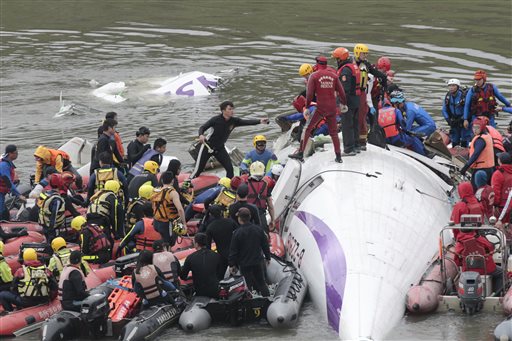
Emergency personnel try to extract passengers from a commercial plane after it crashed in Taipei, Taiwan Wednesday, Feb. 4, 2015. AP
TAIPEI,— A Taiwanese flight carrying 58 people banked sharply onto its side, clipped a highway bridge and careened into a shallow river Wednesday shortly after taking off from Taipei, killing at least 19 people and leaving 24 missing, officials said.
Fifteen people were rescued with injuries.
More than half of the passengers aboard TransAsia Airways Flight GE235 were from China and the death toll was expected to rise as rescue crews cleared the mostly submerged fuselage in the Keelung River. Teams in rubber rafts clustered around the wreckage, several dozen meters (yards) from the shore.
Dramatic video clips apparently taken from cars were posted online and aired by broadcasters, showing the ATR 72 propjet as it pivoted onto its side while zooming toward a bridge over the river. In one of them, the planerapidly fills the frame as its now-vertical wing scrapes over the road, hitting a vehicle before heading into the river.
Speculation cited in local media said the pilot may have turned sharply to follow the line of the river to avoid crashing into a high-rise residential area nearby, but Taiwan’s aviation authority said it had no evidence of that.
It was the airline’s second French-Italian-built ATR 72 to crash in the past year. Wednesday’s flight had taken off at 11:53 a.m. from Taipei’s downtown Sungshan Airport en route to the outlying Taiwanese-controlled Kinmen islands. The pilot issued a mayday call shortly after takeoff, Taiwanese civil aviation authorities said.
TransAsia director Peter Chen said contact with the plane was lost four minutes after takeoff, but that weather conditions were suitable for flying and the cause of the accident was unknown.
“Actually this aircraft in the accident was the newest model. It hadn’t been used for even a year,” he told a news conference.
Thirty-one passengers were from China, Taiwan’s tourism bureau said. Kinmen’s airport is a common link between Taipei and China’s Fujian province.
Taiwan’s Civil Aeronautics Administration said 19 people were confirmed dead, 15 were injured and 24 were still missing.
Wu Jun-hong, a Taipei Fire Department official who was coordinating the rescue, said the missing people were either still in the fuselage or had been pulled down the river.
“At the moment, things don’t look too optimistic,” Wu told reporters at the scene. “Those in the front of the planeare likely to have lost their lives.”
Rescuers could be seen pulling luggage from an open plane door to clear the fuselage.
As a drizzle fell around nightfall, military crews took portable bridges to the scene, where rescue workers were building docks for easier access to the wreckage. About 300 rescue personnel and members of the media stood along the banks of the narrow river.
Part of the freeway above it was littered with debris and was closed after the crash.
Relatives of the victims had not reached the scene by dusk Wednesday but some were expected to arrive Thursday, including some flying from Beijing.
The plane’s wing hit a taxi on the freeway, and the driver and a passenger were injured, Chen said.
Taiwan’s Ministry of National Defense said it had sent 165 people and eight boats to the riverside rescue scene, joining fire department rescue crews.
Another ATR 72 operated by the same Taipei-based airline crashed in the outlying Taiwan-controlled islands of Penghu last July 23, killing 48 at the end of a typhoon for reasons that are still under investigation.
ATR, a French-Italian consortium based in Toulouse, France, said it was sending a team to Taiwan to help in the investigation.
The ATR 72-600 that crashed Wednesday is manufacturer’s best plane model, and the pilot had 4,900 hours of flying experience, said Lin Chih-ming of the Civil Aeronautics Administration.
Greg Walden, Asia managing editor at Flightglobal magazine in Singapore, said the ATR 72-600 is the latest iteration of one of the most popular turboprop planes in the world, particularly favored for regional short-hop flights in Asia.
It has a generally good reputation for safety and reliability and is known among airlines for being cheap and efficient to operate.
While it’s too early to say what caused the crash, engine trouble or weight shifting were unlikely to be causes, Waldron said. Other possible factors include pilot error, weather or freak incidents such as bird strikes.
“It’s too early now to speculate on whether it was an issue with the aircraft or crew,” Waldron said.
The accessibility of the crash site should allow for a swift investigation, and an initial report should be available within about a month, Waldron said.